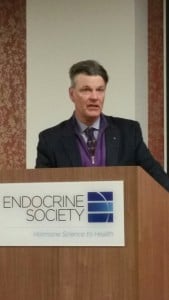
On January 8, incoming Endocrine Society Secretary Treasurer Richard S. Legro, MD, paid a visit to the Society’s Washington, D.C. headquarters for a “lunch and learn” session with Society staff.
Legro, professor of obstetrics and gynecology and public health sciences at Penn State College of Medicine in Hershey, Pa., spoke to the staff about a variety of topics including why he first got into endocrinology as well as what he thinks the Society can do to further promote the specialty around the world.
“I realized early on that I was more interested in birth than death,” he explains, “so that led me to reproductive and pediatric endocrinology” both as a clinician and researcher. He adds that he spends about 75% of his time doing research but he finds the face-to-face contact with his patients just as rewarding as his research duties, calling it a “nice, vicious circle.”
An active Society member for 17 years, Legro serves on the Finance and Audit Committee and previously served on the Research Affairs Core Committee. He also has served on the editorial boards for The Journal of Clinical Endocrinology & Metabolism and Endocrine Reviews. When asked by one of the staffers why he wanted to become more involved in the Society’s leadership, Legro says he wanted to make a meaningful impact the entire world. “The Clinical Practice Guidelines [that the Society publishes] do a wonderful job of disseminating information,” he says, “thus eliminating potential practice errors around the world.”
His other concerns — in response to various staffers’ queries — are to help the Society stimulate more endocrine research; a greater focus on reproduction issues by the Society; and his concerns that electronic health records are not only time-consuming but they limit the treatment time with patients. He also praised the Society for the progress it has made in getting the word out about polycystic ovarian syndrome, a very important hormone anomaly that he feels is not getting enough attention from the public at large. “The Endocrine Society does as good a job as anybody in highlighting PCOS,” he adds.
Legro has served as president of the Androgen Excess-PCOS Society and on the American Society of Reproductive Medicine’s Board of Directors. His honors include being named a Longjiang Scholar, a Chair Professorship at Heilongjiang University of Chinese Medicine in Harbin, China, and being selected by the Chinese government for its 1,000 Talents Program. He received his MD from Mount Sinai Medical School.
These “lunch and learn” sessions were established by Society CEO Barbara Byrd Keenan in order to give the staff an opportunity to not only meet the leadership of the Endocrine Society but to learn about the organization’s initiatives from the member leaders involved in creating them and determining the Society’s direction
In December, staffers got to have similar sessions with editors-in-chief of three Society journals: R. Paul Robertson, MD, editor-in-chief of The Journal of Clinical Endocrinology & Metabolism; Andrea C. Gore, PhD, editor-in-chief of Endocrinology; and Steven R. Hammes, MD, PhD, editor-in-chief of Molecular Endocrinology.
Legro’s three-year term as Secretary Treasurer begins April 4.

